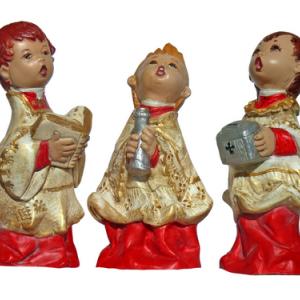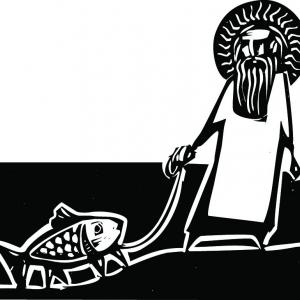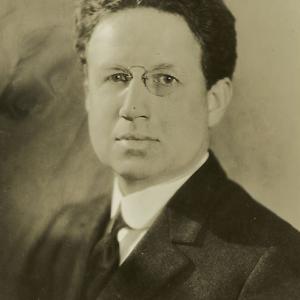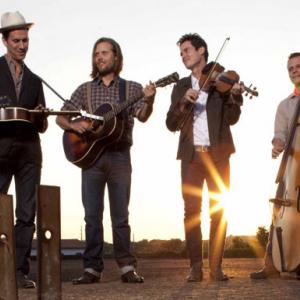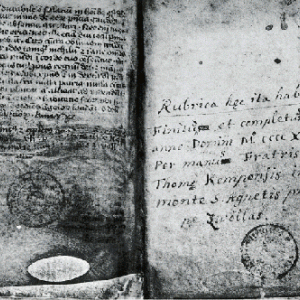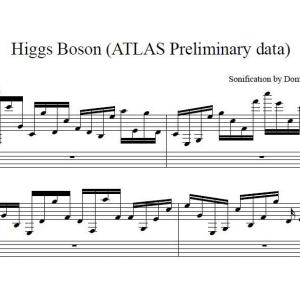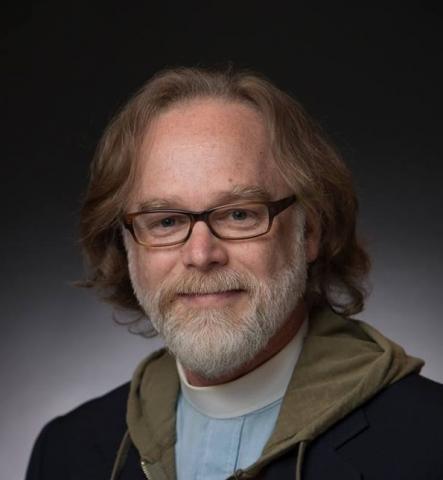
Tripp Hudgins is a doctoral student in liturgical studies and ethnomusicology at the Graduate Theological Union in Berkeley, CA., and is Director of Admissions at American Baptist Seminary of The West. You can read more of his writings on his longtime blog, "Conjectural Navel Gazing; Jesus in Lint Form" at AngloBaptist.org. Follow Tripp on Twitter @AngloBaptist.
Posts By This Author
Tripp Hudgins' Busted Stuff: Abundant Life
What do you have to say about "living abundantly"? How do you deal with anxiety when you think about the future of churches?
“Very truly, I tell you, anyone who does not enter the sheepfold by the gate but climbs in by another way is a thief and a bandit. The one who enters by the gate is the shepherd of the sheep. The gatekeeper opens the gate for him, and the sheep hear his voice. He calls his own sheep by name and leads them out. When he has brought out all his own, he goes ahead of them, and the sheep follow him because they know his voice. They will not follow a stranger, but they will run from him because they do not know the voice of strangers.” Jesus used this figure of speech with them, but they did not understand what he was saying to them. So again Jesus said to them, “Very truly, I tell you, I am the gate for the sheep. All who came before me are thieves and bandits; but the sheep did not listen to them. I am the gate. Whoever enters by me will be saved, and will come in and go out and find pasture. The thief comes only to steal and kill and destroy. I came that they may have life, and have it abundantly.
~ John 10:6-10
First Thoughts: Living With Abundant Anxiety
Editor's Note: Theologian extraordinnaire Tripp Hudgins put together this edition of First Thoughts on living with abundance, butting up against living with anxiety.
The Nones: Saving Perfection
[The "nones"] recite history and Christian leadership's collusion with the agents of empire-building and warfare. Then they say something like, “I'd rather live like Jesus than be a Christian.”
They see the Church as the rich young man and they wonder if anyone actually follows Jesus anymore.
Of course, this is not the only demographic shift at work in the religious life of the world.
There are more Anglicans in Nigeria than there are in England.
More Presbyterians in Ghana than in Scotland. ..
More Baptists in Southeast Asia than in the Southeastern United States.
More Christians go to church in China than in Europe.
In 1900, 71 percent of the world's Christians were in Western Europe. By 2000 that percentage dropped below twenty percent in some European nations.
Here's the real kicker: these are not problems to fix. They are simply realities to be faced.
On Muppets and Candidates
Editor's Note: Theologian extraordinnaire Tripp Hudgins put together this edition of First Thoughts prior to the first presidential debate. Still applicable before this evening's Vice Presidential debate.
Of Saints and Presidents
Today is the Feast Day of St. Francis of Assisi.
You likely have heard of him. Il Poverello. He's the 13th-century aescetic who founded a religious order.
It was, on one hand, a protest order...protesting how the Church had lost its way in relationship to money and helping the poor. It was on the other hand an opportunity for people to come together and do someting rather remarkable in caring for the poor by joining in solidarity with the poor.
The Friars Minor were formed in 1226. St. Clare of Assisi was co-founder. She has her own feast day, of course, but don't lose this opportunity to get to know her as well.
(There was also an incredibly trippy movie made about his life titled Brother Son, Sister Moon. Some day, when no one is watching, you should rent that film. Outrageously strange.)
Francis' prayer is well known, but today I want to offer up this quotation which is similar, but presents a different focus. Less a prayer and more a philosophical edict, these words moved me this morning:
“Where there is charity and wisdom, there is neither fear nor ignorance. Where there is patience and humility, there is neither anger nor vexation. Where there is poverty and joy, there is neither greed nor avarice. Where there is peace and meditation, there is neither anxiety nor doubt.”
The Market and Liturgical Music
Should the market have so much control over liturgical music?
There is nothing new to this question. Not at all. Now, however, there may be much that is new in discoverng the answer.
Once upon a time in the European West, liturgical music was created by musicians who were supported by the patronage of a noble class.* Byrd, Tallis, you know the gang.
Before then it was the monastic composer (Hildegard, et al) who seemed to rule the charts with their chant. Musicians were supported by the Church and the Wealthy in some way and thus created music for worship.
The old markets, of course, have given way to new markets over the centuries, but throughout the history of the Western marketplace, markets (and the people they represent) have had tremendous say in what music we deem as sacred.
Now, in our post-colonial, neoliberal marketplace, how shall we choose liturgical music?
Giving, Receiving, and the Ethics of Music
What if music were ethics?
You know, the art of listening and producing sounds as ethics?
I'm just thinking on the old blog here. I'm preaching next Sunday and I'm thinking about listening and music and how we learn to be good to one another. Somewhere someone wrote "It is better to give than receive."
9/11? My Children Don't Remember
My children don't remember.
I mean, the younger children in my church don't remember. It was eleven years ago. The oldest of them was six when the towers were destroyed and we went to war. I'm wondering how I talk to them about it. I wonder how I tell them the story without subjecting them to the trauma so many people experienced that day.
So, no video footage. No point in giving the kids nightmares. I'm just going to talk about how many kinds of religions there are in the United States. No longer simply a liberal posture, it's an issue of national security, no? If we want to be at peace with our neighbors locally and globally, we need to understand them. We need to have something to work with, some kind of conecpt of how they live.
Wild Goose West: Wild Spirit, Wonderful New Friends
Hello fellow Sojourners!
This is a brief missive for your enjoyment. I just returned from the Wild Goose Festival in Corvallis, Ore.
Yes, Oregon and not North Carolina. You see, in a fit of wisdom, the good people of Wild Goose found a west coast location. I hope it worked well for them because I'm sold on the place.
I wish you could have been there. It was amazing. To tantalize you into attending next year, here (in no particular order) are Nine Good Reasons to Attend The Wild Goose Festival.
1. There are no bugs.
None. Well, some flies, but this is Oregon and not North Carolina and though the nights are chilly and the mornings moreso (I awoke the last morning to see my breath in the air), the sun arose and everything warmed up to make for some of the most beautiful weather you'll ever experience.
2. All the notables are there.
Rachel, Richard (and Richard), Brian, Nadia, Gareth, Bruce, Christian, Amy, Yvette, Hilary, Greg, Steve...So many people to meet and to know.
Socio-Religious Prognostication?
Psalm 78:1-8
Hear my teaching, O my people;
incline your ears to the words of my mouth.
I will open my mouth in a parable;
I will declare the mysteries of ancient times.
That which we have heard and known,
and what our forebears have told us,
we will not hide from their children.
We will recount to generations to come
the praiseworthy deeds and the power of the Lord,
and the wonderful works he has done.
He gave his decrees to Jacob
and established a law for Israel,
which he commanded them to teach their children;
That the generations to come might know,
and the children yet unborn;
that they in their turn might tell it to their children;
So that they might put their trust in God,
and not forget the deeds of God,
but keep his commandments;
And not be like their forebears,
a stubborn and rebellious generation,
a generation whose heart was not steadfast,
and whose spirit was not faithful to God.
I'm pondering the first few lines of this Psalm. They strike me as remarkably different from much of what we're saying these days about generations and faithfulness. It is, it seems, always the younger generations who fail us, who are stubborn and do not recognize the gifts of God. Every so often someone will throw the Baby Boomers (I mean, that's fun, right?) under the bus, but the majority of our attention has been on the future generations or those who are simply young now. We who analyze religious trends are practitioners of religious prognostication.
Want to Know God? Get Religion.
Tony Jones has asked some of us progressive Theobloggers to chime in on God, you know, perhaps some kind of definition or doctrine (that word many of us progressives despise). You can read his invitation here. Tony doesn't want us to talk about Jesus, per se, but about God. I get that. He's in his evangelical context and he gets tired of all the Jesus talk. Lately it seems that the Emergent conversation has been all Jesus all the time. Now, that doesn't bother me, but then again I feel that in my end of the progressive mainline (free church progressive) we don't talk about Jesus enough. We talk about God all the time. Jesus, well, he's a bit of an enigma. What else is there to say? Nevertheless, Tony's invitation is an interesting one and I'm willing to chime in.
One caveat: I'm doing this as a way to speak of one Person of a Trinity. To speak of the One is, in many ways, to speak of the Three and the Unity. But this is just a blog post and not a 20-page essay. So ... yeah.
My answer: If you want to know God, get Religion. (Have you got good religion? Certainly, Lord!) Religion is a combined set of activities embodied by people. These activities are not limited to but may include the following behaviors: liturgy, charity, politics, and even theology (mystical and systematic), and doctrine. Religion can be communal or individual. Religion is the principal craft by which we know (cognition) and understand (hermeneutics) God.
Separation Anxiety: God is Dead! Long Live God!
This is the third and final installment of my little series on Harry Emerson Fosdick, his sermons about Modernism and Science, and how these century-old sermons remind us that our present conversations about the same are anything but new. They may be necessary, but they aren't new. You can read my first post, “I Love How History Repeats Itself,” and my second post, “Science, Faith, and An Ongoing Conversation.”
I want to continue to focus on the same two sermons, "Shall the Fundamentalists Win?" and "The Church Must Go Beyond Modernism," and finish up a line of thought about American Christian Fundamentalism and interlace a third and final sermon entitled, “The Greatness of God” in which Fosdick outlines some of his own understandings of atheism, science, and religion. Typical of Fosdick, there is a tome hidden in between the lines of that sermon. Nevertheless, I'll try to share some of it with you.
What does Fosdick say is the trouble with Modernism? In “The Church Must Go Beyond Modernism,” he lists a few problems. Here's a list:
- “... it is primarily an adaptation, an adjustment, an accommodation of Christian faith to contemporary scientific thinking.”
- for this reason it tends “toward shallowness and transiency” and thus cannot adequately represent the Eternal;
- “Unless the church can go deeper and reach higher than that it will fail indeed.”
- “... excessively preoccupied with intellectualism” eschewing the heart and thus missing much of Christian spirituality
- excessive sentimentality, which means the eternal progress of the human character and the eradication of evil and the loss of moral judgment, scientific progress being equated with human moral progress
- “... modernism has even watered down and thinned out the central message and distinctive truth of religion, the reality of God.”
The Never-Ending Story
The evening was warm. Seated at the small desk by the windows I opened my Bible and started to read from Jeremiah, "Seek the welfare of the city to which I send you." The passage was also inscribed over the entrance to the cloisters of Richmond Hill, the old convent turned retreat center in the Church Hill neighborhood of Richmond, Va., overlooking downtown. I was on retreat and seeking a little inspiration.
Seek the welfare of the city, said Jeremiah. Pray for the city, say the people of Richmond Hill. Love the city. Work for the good of the city. This is the city of God. Every city is the Holy City.
The verse from Jeremiah actually continues on. It's a bit more involved than the brief passage inscribed over the entryway:
"But seek the welfare of the city
to which I have sent you into Exile,
and pray to the Lord on its behalf,
for in its welfare you will find your welfare." (Jer. 29:7)
Oh no ... I'm gonna have to work this out.
Science, Faith, and An Ongoing Conversation
In a recent post here on God's Politics, Derek Flood suggested (as many have lately) that Christian communities need to start taking this whole "faith and science" thing seriously.
I posted some relatively snarky comment on my Facebook page about it (I apologize for the snark) suggesting that the authors of these recent posts about faith and science are ignoring about a century's worth of conversation and theology. Perhaps more.
Let me give you an example of what I mean in Harry Emerson Fosdick.***
As I said just yesterday, Fosdick was famous for lots of things, particularly the sermon "Shall The Fundamentalists Win?" which he preached on May 21, 1922.
It was a call to arms of sorts within the church, encouraging tolerance and a willingness to engage the minds of believers and unbelievers alike in a time of incredible scientific discovery.
I Love How History Repeats Itself
Okay... for all my friends out there. No, history does not repeat itself. Yes, history is a human construct. Now, if you will all just work with me, take a gander at this longish quotation from the Introduction to The Meaning of Prayer (1916) by Harry Emerson Fosdick (pictured here). The introduction was written by John R. Mott. It could have been written last week.
These meditations and studies on prayer are most timely. Never have there been such extensive and such convincing evidences of the poverty and inadequacy of human means and agencies for furthering the welfare of of humanity; never has there been such a widespread sense of the need of superhuman help; never have there been such challenges to Christians to undertake deeds requiring Divine cooperation; never has there been such a manifest desire to discover the secret of the hiding and of the releasing of God's power. Interest in prayer is world-wide. This is shown in the prominence of this subject in addresses and sermons in all lands, as well as by the growing volume of books and pamphlet literature in different languages. The multiplication of Calls to Prayer and of Prayer Circles, and the formation of Prayer Bands and of Leagues of Intercession, constitute similar testimony. Among Christians everywhere, and even among those who would not call themselves believing Christians, there is being manifested an earnest desire to understand what prayer is and to engage more fully in its exercise.
... An alarming weakness among Christians is that we are producing Christian activities faster than we are producing Christian experience and Christian faith; that the discipline of our souls and the deepening of our acquaintance with God are not proving sufficiently thorough to enable us to meet the unprecedented expansion of opportunity and responsibility of our generation. These studies and spiritual exercises in helping men and women to form that most transforming, most energizing, and most highly productive habit — the habit of Christlike prayer — will do much to overcome this danger.
Video Monday: 'Wagon Wheel'
Old Crow Medicine Show's Ketch Secor and Critter Fuqua first met in the seventh grade in Harrisonburg, Virginia in Rockingham County, and began playing music together. They performed open mics at the Little Grill diner which was "really the first chance that . . Critter had to play on stage." Being "a bit younger" than the "college students at James Madison University who typically hung out there" Secor "was considered a townie." As Secor says today: "They knew that we had talent, but it was raw. I mean, I was up there beating on a jaw harp when I was 13." (wiki)
Virginia boys.... Amen.
Watch the video for the band's song "Wagon Wheel" inside the blog ...
On Lamentation
This morning I read and sang this canticle.
Come, let us sing to the Lord;
let us shout for joy to the rock of our salvation.
Let us come before his presence with thanksgiving
and raise a loud shout to him with psalms.
For the Lord is a great God,
and a great king above all gods.
In his hand are the depths of the earth,
and the heights of the hills are his also.
The sea is his, for he made it,
and his hands have moulded the dry land.
Come, let us bow down and bend the knee,
and kneel before the Lord our Maker.
For he is our God,
and we are the people of his pasture
and the sheep of his hand.
O that today you would hearken to his voice!
Psalm 95:1-7 (Venite)
Then I lamented. I lamented the work of human beings to tear down what God holds in God's hands. I lamented that my friends in the peace movement callously sent a press release decrying the gun lobby within what seemed like moments after the smoke cleared in Aurora. I lamented the inane anti-Darwinian posture of other Christians. We're all looking for something to blame. We cannot simply sit in our sackcloth and our ashes and lament ... lament our own failure, lament the actions of someone raised in church, lament our inability to protect the innocent, lament our powerlessness.
We cannot and will not lament our powerlessness. We need to learn how.
Imitation of Christ: Thomas a Kempis, Love and Learnin'
Nothing is sweeter than love, nothing stronger, nothing higher, nothing wider,
nothing more pleasant, nothing fuller or better in heaven or earth;
for love is born of God, and can rest only in God above all created things.
And so my musings on Thomas a Kempis, for whom Jesus the Christ was Love Incarnate, begin.
Will it frame my day? Will it help me make sense of French class?
Is There No Good Economic Reason To Get A Ph.D.?
Maybe someone pursuing a Ph.D. in Liturgical Theology and Ethnomusicology is shouldn't be the one to offer this reflection.
Heck, maybe a Ph.D. in Mechanical Engineering or in Astrophysics would be a wise economic choice. I can't say.
I've been mulling over some of the news stories out there hyping either end of the (political?) reality of spending more money (and time, let's not forget time) on higher education. It leads me to a couple of questions:
Does the present rate of student debt have a snowball's chance in Tartarus in being repaid? Will the students, especially the so-called "nontradtional student" like myself, actually see a return in their investment?
If you believe NPR, the answer may be "no."
Music, Higgs Boson, and Feud
I haven't written about the discovery of the Higgs Boson particle yet. I think I posted about it on Facebook or Pinterest or somewhere like that. I'm excited by the discovery. Actually, I'm excited by discovery in general. Discovery is good stewardship. This particular discovery is particularly intriguing (Get it? I used "particular" since we're talking about particles! I'm so clever in the morning.).
So, let me begin with a simple prayer. I want to get into this a bit.
God of the moon, God of the sun,
God of the globe, God of the stars,
God of the waters, the land, and the skies,
Who ordained to us the King of promise.
It was Mary fair who went upon her knee,
It was the King of life who went upon her lap,
Darkness and tears were set behind,
And the star of guidance went up early.
Illumed the land, illumed the world,
Illumed doldrum and current,
Grief was laid and joy was raised,
Music was set up with harp and pedal harp.


